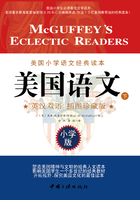
第6章 The Fish I Didn't Catch 那条我没有抓到的鱼
John Greenleaf Whittier was born near Haverhill, Mass., in 1807, and died at Hampton Falls, N.H., in 1892. His boyhood was passed on a farm, and he never received a classical education. In 1829 he edited a newspaper in Boston. In the following year he removed to Hartford, Conn., to assume a similar position. In 1836 he edited an antislavery paper in Philadelphia. In 1840 he removed to Amesbury, Mass. Mr. Whittier's parents were Friends, and he always held to the same faith. He wrote extensively both in prose and verse. As a poet, he ranked among those most highly esteemed and honored by his countrymen. "Snow Bound" is one of the longest and best of his poems.
Our bachelor uncle who lived with us was a quiet, genial man, much given to hunting and fishing; and it was one of the pleasures of our young life to accompany him on his expeditions to Great Hill, Brandy-brow Woods, the Pond, and, best of all, to the Country Brook. We were quite willing to work hard in the cornfield or the haying lot to finish the necessary day's labor in season for an afternoon stroll through the woods and along the brookside.
I remember my first fishing excursion as if it were but yesterday. I have been happy many times in my life, but never more intensely so than when I received that first fishing pole from my uncle's hand, and trudged off with him through the woods and meadows. It was a still, sweet day of early summer; the long afternoon shadows of the trees lay cool across our path; the leaves seemed greener, the flowers brighter, the birds merrier, than ever before.
My uncle, who knew by long experience where were the best haunts of pickerel, considerately placed me at the most favorable point. I threw out my line as I had so often seen others, and waited anxiously for a bite, moving the bait in rapid jerks on the surface of the water in imitation of the leap of a frog. Nothing came of it."Try again," said my uncle. Suddenly the bait sank out of sight. "Now for it," thought I; "here is a fish at last."
I made a strong pull, and brought up a tangle of weeds. Again and again I cast out my line with aching arms, and drew it back empty. I looked at my uncle appealingly. "Try once more," he said; "we fishermen must have patience."
Suddenly something tugged at my line, and swept off with it into deep water. Jerking it up, I saw a fine pickerel wriggling in the sun."Uncle!" I cried, looking back in uncontrollable excitement, "I've got a fish!" "Not yet," said my uncle. As he spoke there was a plash in the water; I caught the arrowy gleam of a scared fish shooting into the middle of the stream, my hook hung empty from the line. I had lost my prize.
We are apt to speak of the sorrows of childhood as trifles in comparison with those of grown-up people; but we may depend upon it the young folks don't agree with us. Our griefs, modified and restrained by reason, experience, and self-respect, keep the proprieties, and, if possible, avoid a scene; but the sorrow of childhood, unreasoning and all-absorbing, is a complete abandonment to the passion. The doll's nose is broken, and the world breaks up with it; the marble rolls out of sight, and the solid globe rolls off with the marble.
So, overcome with my great and bitter disappointment, I sat down on the nearest hassock, and for a time refused to be comforted, even by my uncle's assurance that there were more fish in the brook. He refitted my bait, and, putting the pole again in my hands, told me to try my luck once more.
"But remember, boy," he said, with his shrewd smile, "never brag of catching a fish until he is on dry ground. I've seen older folks doing that in more ways than one, and so making fools of themselves. It's no use to boast of anything until it's done, nor then, either, for it speaks for itself."
How often since I have been reminded of the fish that I did not catch. When I hear people boasting of a work as yet undone, and trying to anticipate the credit which belongs only to actual achievement, I call to mind that scene by the brookside, and the wise caution of my uncle in that particular instance takes the form of a proverb of universal application: "NEVER BRAG OF YOUR FISH BEFORE YOU CATCH HIM."
约翰·惠蒂尔,生于1807年,于1892年在汉普顿病逝,他的童年是在农场度过的,从没接受过正规的教育。1829年,他在波士顿给一家报社当编辑,随后他去了哈特福德,也是做同样的编辑工作。1836年他在费城成立了反奴隶制的报社。1840年他去了埃姆斯伯里,惠蒂尔先生的父母是朋友,作为一名诗人,他被当地人致以最高的尊重与敬意。《雪地冰天》是他写的最好、最长的诗之一。
我们的单身汉叔叔和我们住在一起,他是个安静且和蔼的人,兴趣是狩猎和钓鱼,和他一同前去山里、树林、池塘等,是我们的一大乐趣。
我还记得我的第一次探险好像还是昨天的事,我的人生里有着许许多多的趣事。但是都没有我从叔叔手里接过我的第一根鱼竿更能让我感到快乐。我记得那是夏天一个无风、阳光灿烂的一天。大树的阴影投射在了我们的道路上,显得格外的凉爽,叶子更加绿了、花儿也更加漂亮了、鸟儿的叫声比以往更加动听了。
我的叔叔经验丰富,他知道哪里是捕获小梭鱼的最佳场所,他把我放在了捕小梭鱼的最佳位置。我像其他钓鱼的人一样,抛出了鱼线,然后焦急地等待它上钩,我用青蛙在水上跳跃的方式,把鱼饵提出水面,并快速的让它在水面上来回的抽动,但是什么也没有出现。“再试一次。”我的叔叔说道。突然鱼漂沉入了水底。“就是现在,拉起来,”我想,“这回终于有鱼了。”
我用力地把鱼漂拉了回来,是一些杂草,我一次又一次地用酸痛的胳膊抛出鱼饵,可每次都是无功而返。我可怜巴巴地看着我的叔叔,“再试一次,”他说道,“我们钓鱼的人必须要有耐心。”
突然我感觉到有什么东西在拉我的鱼线,很快,鱼线沉入水底,我猛地把鱼饵拉了起来,看到一条硕大的梭鱼在金灿灿的阳光里摆动着尾巴。“叔叔!”我难以控制激动的情绪,大叫道,“我钓到了大鱼!”“还没呢。”我的叔叔说道。我看到这条受了惊吓的鱼像箭一般地冲进了小河里,我的鱼钩上面空了,钓到的大鱼就这么跑掉了。
我们总是愿意把童年琐事所带来的悲伤和成年人所遭受的悲痛做比较,然而年轻人不同意我们的观点。我们的悲痛,受到了理由、经验还有自尊的调整和制约。但是孩童时期的悲痛是毫无理由的、完全可以化解的,这是完全摒弃激情的表现,一个玩具娃娃的鼻子坏了,就觉得这个世界抛弃她了,这种想法是很荒谬的。
为了克服我的失落感,我坐在了离我最近的跪垫上,并且拒绝别人安慰我,即使是我叔叔确信地告诉我,这小溪里还有数不清的鱼也无济于事。他重新弄了我的鱼饵,并把鱼竿再一次的放在了我的手上,并且跟我说,再试试运气。
“不过,要记住,孩子,”他说道,露出了狡猾的微笑,“永远不要在鱼被拽上岸之前,炫耀自己钓到了鱼。我看到过的老钓手都这么干,结果总是让自己出丑。所以说,在一件事情做完之前就夸耀是没有用的。”
每当我听到有人在没做完事就开始炫耀自己的时候,我就会想起那条我没有钓到的鱼。小溪边的场景在我的脑海里还历历在目,我叔叔那次对我的教诲可以换成一句全球通用的谚语:“在抓住鱼之前,不要吹嘘自己钓到了鱼。”